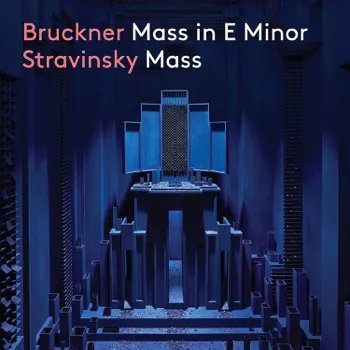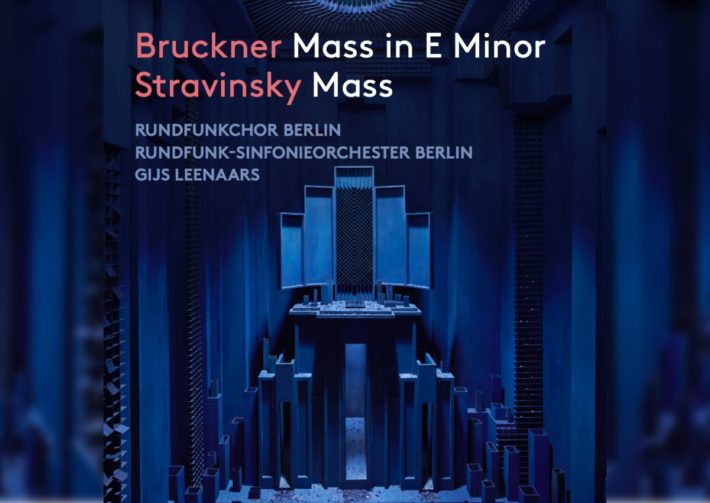Two composers, one text, two very different perspectives, this summarises the latest release from the Rundfunkchor Berlin, directed by their principal conductor Gijs Leenaars, accompanied by wind players from the Rundfunk-Sinfonieorchester Berlin. Juxtaposing masses by Bruckner and Stravinsky, this album makes for curious and interesting listening. The conservative Bruckner has moments of modernism whilst the progressive Stravinsky takes inspiration for more distant times. What unifies these two works is their orchestration; both composers opting to accompany the choirs with ensembles of wind instruments.

As the first Kyrie of the Bruckner Mass unfolds, the beauty of tone of the Rundfunkchor Berlin becomes apparent. The diction is unified, precise and pristine, yet commendably natural-sounding. The choral blend Leenaars caresses is exceptional, the altos come to the fore in the “Kyrie”, the sopranos soar in the “Sanctus” without overpowering, allowing the middle lines to be savored as a beautiful web of polyphony grows, and an air of solemnity prevails in the “Angus Dei”. The winds are subtly balanced against the choir and the thicker textures maintain a lightness and a transparency.
The phrasing in Bruckner can be regular, angular and sometimes mechanical and happily Leenaars avoids falling into this rhythm. He understands the architecture in the movements, building a grand, impressive and ornate cathedral of sound out of the Mozartian textures. The Rundfunkchor’s rich, velvety sounds are weightier than the purer angelic-like Collegium Vocale Gent under Philippe Herreweghe, or the more symphonic choral approach from Chor des Bayerischen Rundfunks under Eugen Jochum, which sounds a little dated. Overall, this is a well-considered, well-balanced and well-paced performance.
As composition goes, Stravinsky’s Mass lacks the richness and warmth of the preceding Bruckner. The colors are cooler, more astringent, but intense and interesting. Beginning rather conventionally but taking the occasional chromatic turn. The “Kyrie” is immediately engaging, once again highlighting the superb balance of the choir and wind players, even when considering how differently Stravinsky writes for the wind instruments. Here they penetrate through the choral textures with lovely refinement. Hear how, in the Gloria, Stravinsky makes use of two soloists against the reeds of the ensemble; the oboes in the flourishing lines have a naturalness and spontaneity, which is cleverly echoed by the singers.
Another highlight is the Sanctus, a very different take on the text than Brickner’s. The Rundfunkchor emphasizing their complete conviction to bring the notes alive whilst giving Leenaar’s vision gravitas. The concluding Angus Dei is musically enigmatic, and an unexpected closure. The individuality of the work peaks here, in what is a highly engaging performance. Leenaar’s finds something more spiritual in the work than other recordings, including the composer’s own or Lenard Bernstein’s versions, both lack the same finesse as the Berlin team. Closely recorded in a well-defined acoustics, this is a distinctive release.
Bruckner – Mass in E Minor for Double Choir and Wind Instruments
Stravinsky – Mass for Choir and Wind Instruments
Rundfunkchor Berlin
Wind players of the Rundfunk-Sinfonieorchester Berlin
Gijs Leenaars, conductor
Pentatone, CD PTC 5186774




















